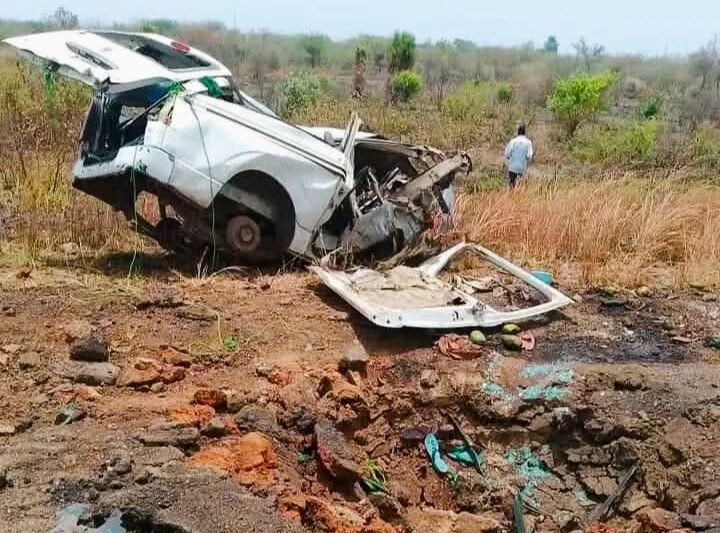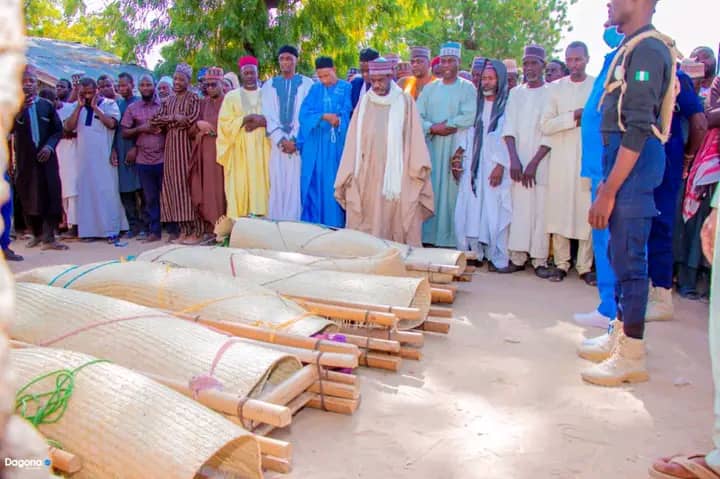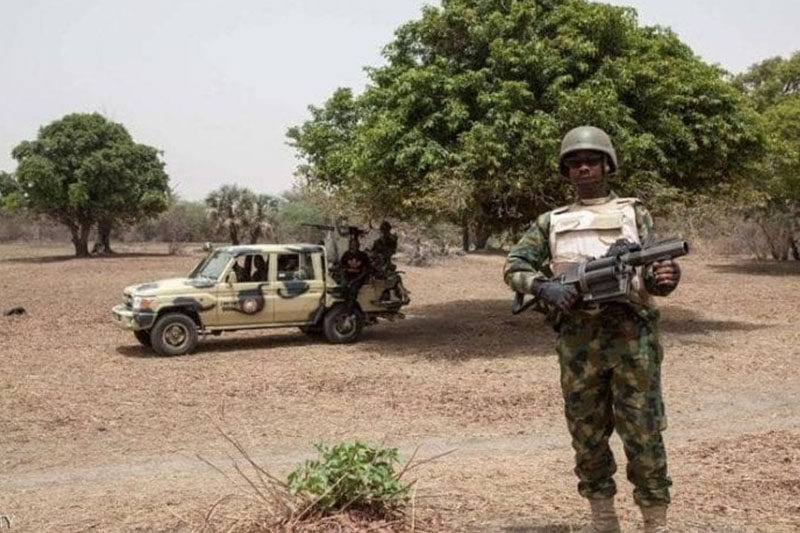Deadly blast just days after Borno State governor holds a special expanded security meeting to discuss the escalation of attacks – he says the state is ‘losing ground’ to insurgents.
A commercial bus driver and eight passengers have died in an improvised explosive device (IED) blast in Borno State in Nigeria’s northeast.
Twenty-one passengers were seriously wounded and are receiving treatment in the State Specialist Hospital in Maiduguri, the capital of Borno State.
IED blast along Maiduguri-Damboa-Biu highway
The blast happened at about 12pm on Saturday, April 12, when the driver rode over an IED on the Maiduguri-Damboa-Biu federal highway.
The IED was suspected to have been planted by insurgents from the Jamā’at Ahl as-Sunnah lid-Da’way Wa’l-Jihād (JAS) group, more commonly referred to as Boko Haram.
The bus was part of a convoy of both private and commercial vehicles that were being escorted by the military and other security operatives. They were travelling from Damboa to Maiduguri.
Borno State governor Babagana Umara Zulum visited the injured in the hospital.
He assured them that they would receive free medical services and he gave ₦50,000 to each of the victims as compensation.
“It is regrettable that it is happening at this time. Since last year or so, we have not witnessed an improvised explosive device attack. The road was closed for about one month and I believe this is one of the reasons the insurgents had the luxury of planting an IED,” Zulum said.
“I urge the Nigerian military and other security agencies to beef up surveillance along the road so that such incidents do not happen again.”
Special expanded security meeting
The deadly blast occurred just days after Zulum held a special expanded security meeting to discuss the escalation of attacks by JAS and its offshoot, the Islamic State West Africa Province (ISWAP).
At the meeting, held on Tuesday, April 8, at State Government House in Maiduguri, Zulum conceded that the state was “losing ground” to JAS and ISWAP.
The meeting was attended by the General Officer Commanding 7 Division, Major-General Abubakar Haruna, sector commanders, the commissioner of police, heads of other security agencies and traditional rulers.
“The renewed Boko Haram attacks and kidnappings in many communities almost on a daily basis without confrontation signals that Borno State is losing ground,” Zulum said.
“As you are all aware, my administration has been very supportive of the military and other security agencies in the fight against Boko Haram and other terrorists leading to relative peace in the last three years,” Zulum said.
“In as much as Borno government, under my leadership, commends the federal government under the leadership of President Bola Tinubu and the security agencies for their unwavering support in the fight against Boko Haram, more efforts have to be put in place through equipping and deploying technological warfare to the military to stem the tide of all renewed attacks bedevilling parts of the Sahelian region of Borno which shares international borders with the three African countries of Chad, Niger and Cameroon.
“The recent attacks and dislodgement of military formations in Wajirko, Sabon Gari in the Damboa Local Government Area, Wulgo in Gamboru Ngala, Izge in the Gwoza Local Government Area, among other related killings of innocent civilians and security agents, are a call for serious concern, and it is a setback in the fragile state of Borno and the northeast region.
“It seems we are losing ground and this is a very important thing that we need to discuss. It seems the focus of the Nigerian Army and Federal Ministry of Defence is not in the northeastern states of Nigeria.
“Considering the strategic location of the northeastern states, we deserve to receive the desired attention. The Sahel region is very important. Borno’s location is also very important in the fight against the insurgency; Borno State borders the Republic of Chad, Niger and Cameroon.
“A lot of foreigners, foreign insurgents are coming into Borno State through these borders. If nothing is done, the state will return to turmoil again. I believe the President of the Federal Republic of Nigeria [Tinubu] will not accept that. If as much as possible we can work together with the Nigerian army, it is the right time to save the situation,” Zulum said.
He urged the army not only to mount checkpoints and guard towns and villages, but also to “take the battle to the insurgents”.
“They should not grant breathing space to the Boko Haram to regroup, re-arm and carry out attacks on our territory.
“I want to assure the people of Borno State that, Insha Allah [God willing], under my watch, we will not allow the security situation to deteriorate. Our administration will provide more support to security agencies and we will strengthen the resilience of our youth volunteers fighting alongside the military.”
He said the resettlement plan of the state government was in top gear but could not be achieved without tight and efficient security.
Zulum said the state government would continue to work closely with the Armed Forces to execute developmental and peace-building programmes.
Shehu of Borno speaks out
The Shehu of Borno, Alhaji Abubakar Ibn Umar Garbai Al Amin El-Kanemi, said three local government areas – Abadam, Marte and Guzamala – were “under the control of Boko Haram terrorists”.
“The three local governments are no-go areas, especially Abadam, it is a no-go area, people are afraid to go.”
He said it was the same in Marte and Guzamala, “a very big town bordering Cameroon”.
“Our people were forced into exile to neighbouring countries to avoid Boko Haram attacks.”
He claimed Borno State was “being compromised by settlers who entered Nigeria under the guise of acquiring Islamic education and engaging in businesses”.
Most of the local government areas created since 1976 were without basic amenities such as access roads, electricity and others, he said.
He appealed to the federal government to reconstruct the “trunk A” roads, which included Biu-Damboa-Maiduguri, Maiduguri-Dikwa-Ngala, Maiduguri-Monguno-Kukawa and Biu-Damaturu which, he said, were in a deplorable state.
Meeting with army, naval and air force chiefs
On Thursday, April 10, Zulum held a closed-door meeting with Nigeria’s top military leadership in Abuja.
The meeting – with the chief of army staff, Lieutenant General Olufemi Olatubosun Oluyede, the chief of naval staff, Vice-Admiral Emmanuel Ikechukwu Ogalla, and the chief of air staff, Air Marshal Hasan Bala Abubakar – was to deploy a renewed push for coordinated action against insurgents.
Sources said the discussions centred on strengthening military operations in the northeast, improving intelligence sharing and addressing the recent surge in insurgent attacks.
Zulum called for decisive action to avert the situation from getting out of control.
Zulum was accompanied by the senators representing Borno South, Mohammed Ali Ndume, Borno North, Mohammed Tahir Monguno, and Borno Central, advocate Kaka Shehu Lawan.
Zulum said he had received assurances from the military leadership “that they will do everything possible to control the situation”.
“We are very happy with their response,” he said.
Reaction to deteriorating insecurity
Senator Mohammed Tahir Monguno, who represents Borno North, said: “The attention of the federal government and the military seems to be on the northwest states, hence the deteriorating security situation in Borno State and other northeastern states as Boko Haram and ISWAP insurgents resume incessant attacks on communities and military bases.
“Under my senatorial district, three local government areas are still inaccessible for people –Guzamala, Marte and Abadam. Most of the people fled their hometowns and are currently taking refuge in the neighbouring country of Niger.
“The primary responsibility of the government is to ensure protection of lives and property, thus there is need for the federal government to deploy more troops and more military hardware to counter the rising insecurity in the northeast.
“Nigeria, Chad, Niger and Cameroon need to synergise efforts to combat Boko Haram and ISWAP insurgents in the Lake Chad region,” Monguno said.
Senator Ali Ndume, who represents Borno South, said: “From November last year to date, there have been more than 250 attacks in the state.
“We have lost more than 100 soldiers, nearly 300 civilians. Even though our soldiers gallantly killed 800 of those terrorists within this period, the deteriorating security situation in the state is very concerning. It is like a stagnated situation. The security agencies are trying their best, but they are not well equipped enough to match the evolving threats we are facing.”
Zanna Hassan Boguma, Zulum’s senior special adviser on culture and regional integration, said: “The resurgence of Boko Haram activities in the northeast and recent waves of attacks on our military formations in Borno and Yobe States is very alarming, hence the need to seek divine intervention and prayers.
“Boko Haram and ISWAP insurgents are seriously attacking military formations and carting away ammunition and hardware and threatening peace in Maiduguri.
“The counterterrorism strategy is now becoming increasingly weaker, while the insurgents are becoming more focused, daring and determined which calls for the need for proactive measures and prayers by all of us.”
Kachalla Grema Kyari, a security analyst based in Maiduguri, said: “It’s imperative for the federal government of Nigeria to listen to what the Borno State governor and the Shehu of Borno said … they know what’s going on and they get firsthand security reports.
“The federal government needs to focus on Borno State as the epicentre of one the most deadly terrorist organisations in the world [JAS /ISWAP] to address the rising insecurity by intensifying the counterinsurgency operations strategy with deployment of modern military weapons such as attack drones.”
SHETTIMA LAWAN MONGUNO








